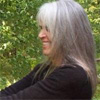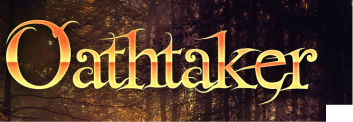http://cmjwallace.com

My favorite traditionally published fantasy author is Stephen R. Donaldson. His Mordant’s Need series, which includes The Mirror of Her Dreams and A Man Rides Through, is one of the most satisfying fantasies I’ve ever read. (And yes, it’s well edited!) The language is beautiful and evocative, which is difficult to find these days. In fact, some of the most popular books of the past decade are devoid of rich prose and barely rise above the fourth-grade reading level typically used in newspapers. I truly don’t understand the attraction.
But I digress.
Donaldson’s tale rests on a solid foundation of back story that adds intricate layers of realism, which I believe is a must for any narrative that strives for depth. The heroine, Teresa, is wimpy and at times spineless—the Donaldson books I’ve read lack strong female characters in general—but I otherwise like the series so much that it doesn’t detract terribly. Although she is one of the main characters, she shares the stage with a man who does make a fulfilling hero despite his flaws and helps compensate for her shortcomings.
I prefer complicated plots, and the author delivers. The kingdom is at war, mysterious saboteurs are trying to bring it to its knees from within for reasons unknown, the protagonists and the mad king may be more than they seem, and the heroine has entered Mordant through a mirror in our world (very Lewis Carroll, and a device I’ve been in love with since I first read his books).
But the primary reason I love Mordant’s Need is that the series brings alive another world, as any good book should, taking me out of time and place and firing my imagination. And I can visit as often as I like.
http://www.robinlythgoe.com

So you can imagine my squeak of delight when I saw the cover of Brood of Bones, by indie author A.E. Marling. The artworks is by Eva Soulu, and I’d like to have that print hanging in my house, it’s so lovely. The book didn’t disappoint, either. A magic-wielder afflicted with a sleeping disorder is caught up in a fantastic terrific whodunnit. The setting and the magic are skillfully portrayed; the characters are complex and not always predictable. The main character, Hiresha, struggles not only with her sleeping problem, but with the past that has formed her; her position is her armor and her purpose. Maid Janny is a gem of irreverence, while the Lord of the Feasts is both charming and terrible. The deposed arbiter of the city is exasperating at the same time she is delightful, and the two city leaders (a pair of priests representing different deities) are not what they might seem. The formatting and editing are first-rate—and I’m picky, so you can relax on that count.
Traditional-wise, I think Michael Whelan became one of my favorite fantasy artists when I came across The Dragonbone Chair, first in the Memory, Sorrow, and Thorn series by Tad Williams. Three wonderfully thick books long (the paperback publication of the third was divided into two volumes), the series has yet to be knocked off its pedestal as my all-time favorite epic fantasy. The world Williams describes is intricate and deep, with a rich (but not overwhelming) history. The characters—well, it’s easy to forget they’re the product of someone’s imagination. There are complex cultures and races, folklore, humor, tragedy and growth all masterfully blended into the grand conflict of Good against Evil. The power struggle between the heirs to the throne and the presence of three magic swords might sound like standard fare, but it’s just so darned well done! Toss in alliances, betrayals, politics, epic military battles; then factor in world building and character development, pacing, and emotional impact, and by golly, if you haven’t read this, what are you waiting for??

I am fascinated with Goodkind’s ability to keep me on the edge of my seat, constantly turning pages, waiting with baited breath for the next thing to happen—because there is not a moment in which something is not happening. With heart hounds, dragons, wizards, sorceresses, the Seeker of Truth, the Mother Confessor, horrific villains, and so many more creatures and characters, some wholly new and unique, Goodkind’s story is utterly spellbinding. From this series (which I estimate runs 8 - 10,000 pages), I can readily name more than 50 “main characters.” These are characters central to some portion of the story, characters I got to know throughout the series, characters I may love or hate—but will never forget. Add to this Goodkind’s ability to weave elements of the story—sometimes beginning with a mere mention early on and then reintroducing that element volumes later when it becomes a key ingredient to the overall story—and you have a truly great series. For this reader, Goodkind is unmatched.
As to indie published fantasy works, I admit that I have not read all that many, but one I found particularly well done and entertaining was The God King (Heirs of the Fallen Book 1), by James A. West. Notwithstanding the fact that this work makes use of names with (what to me are dreaded) apostrophes (“Geh’shinnom’atar), and notwithstanding the fact that the work includes “dead people walking,” (two things I generally highly dislike reading or reading about), I found The God King quite enjoyable.
West’s voice is intriguing, his word pictures are carefully painted, and his word choices clever in that they help to create a unique alternate world. West’s characters were honorable at times, quirky at times, but always consistent and in the end, believable. Perhaps the highest praise I could offer in this regard is that West drew, in The God King, a genuinely legitimate lead woman character. She was firm in the face of danger, was committed to helping to overcome evil, and was a full member of the otherwise all-male “team.”
KRISTIE KIESSLING
www.KristieKiessling.blogspot.com

Here's the weird thing: I liked the characters despite their too-convenient back stories. I liked the bad guys. Though they were predictable too, I thought they could be so much more. There were hints of much more, and the too short tale never delivered more than hints. The story had potential but it bogged down, despite being so short, when the author used unnecessary foul language. Worse, he used colloquialisms that drew me out of the nebulous at best setting and into the present day. I half expected someone to hand the hero a cola at some point. I do hope Mr. Benage keeps trying. I think he could actually write something exciting if he really put his mind to it. This felt a bit to me as though he had this tale and tidied it up and published it to get out there. I don't blame him for that, I just hoped against hope for more. If I'd been allowed to tell you about As the Crow Flies by Robin Lythgoe, I would have chosen that as my enjoyed indie read.
That story carries well what is the burden of indie works: to make them better than the world expects them to be because they are indie works.
My traditional selection of a story I enjoyed is Hood by Stephen R. Lawhead. Lawhead has long been one of my favorite authors and his novels lean toward the historical, but there is that element of magic that speaks to fantasy and I love that. Hood is the tale of Bran ap Brychan, heir to the throne of Elfael. Set in the primeval forest that borders Wales, it is a retelling of a familiar old legend full of Celtic mythology and political intrigue. At just shy of 500 pages it is an epic worthy of the name in all aspects. Hood swept me away into the greenwood and carried me along with Bran through battles, Normans, the Red King and the discovery of a destiny of which no runaway, reluctant hero could have dreamed.
I am excited by what independent publishing can offer the world and I believe that the future of indie is rich worlds and tales along the lines of As the Crow Flies rather than A Circle of Iron. As for Lawhead and Hood they have given me what traditional publishing has almost always delivered, that excitement of worlds unknown kindled in me when I was young and read Tarzan or The Hobbit.


